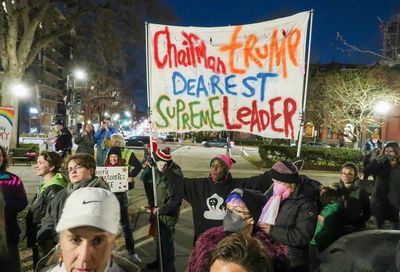O’Malley Signs Transgender Rights Bill
Nondiscrimination bill slated to go into effect in October now faces potential repeal referendum


Maryland Gov. Martin O’Malley (D) on Thursday, May 15 signed into law a bill prohibiting discrimination on the basis of gender identity or expression in the areas of employment, housing, credit and public accommodations, extending vital civil rights protections to transgender Marylanders.
The Fairness for All Marylanders Act, also known as SB 212, previously passed the Maryland Senate in March by a 32-15 vote, and passed the House of Delegates, 82-57, later that month. Because similar protections already exist in Baltimore City, Baltimore County, Howard County, Montgomery County, and the city of Hyattsville, which together comprise about half of the state’s population, the bill, as signed into law, simply extends protections to transgender people living in the state’s 20 remaining counties. As written, the bill is scheduled to take effect on Oct. 1.
In statements on his office’s website, O’Malley grouped the transgender rights bill in with other bills related to the budget and protecting the state’s wetlands, saying that all those efforts “will ensure that we continue to make critical progress toward a better shared future for our state,” and that the transgender bill, in particular, recognizes the human dignity of all Marylanders. In 2002, as the mayor of Baltimore City, O’Malley signed similar legislation into effect to make the city the first jurisdiction to protect transgender individuals from discrimination.
“Today, with the signing of the Fairness for All Marylanders Act, we’re taking a critical step forward in protecting all Marylanders from discrimination,” Lt. Gov. Anthony Brown said in a statement. “This is important legislation at a time when more than half of transgender residents in our state have reported harassment in their community. I’d like to thank and congratulate all of the lawmakers, advocates, and community leaders who made this legislation possible, and fought to ensure that all Marylanders are treated and protected equally under the law.”
Various advocates for transgender rights praised the signing of the bill into law, including representatives from Gender Rights Maryland and from the Maryland Coalition for Transgender Equality (MCTE), a collection of more than 50 civic, political, religious or community groups that advocated on behalf of SB 212’s legislative passage.
“I applaud the Governor for his completing the process by which the transgender community has risen to full legal equality in the state of Maryland,” Dana Beyer, the executive director of Gender Rights Maryland, said in a statement. “He started this process in 2002 by making Baltimore City the first protected jurisdiction; now, following the addition of Montgomery, Howard and Baltimore counties, Governor O’Malley gets to close the circle for all residents of our state.”
“We are proud to have worked with the O’Malley-Brown Administration on passing The Fairness for All Marylanders Act,” Carrie Evans, executive director of MCTE member Equality Maryland, said in a statement. “We especially want to thank the Lt. Governor for testifying before the House Committee this session, and the Governor for addressing our rally. Their efforts were effective and helped continue the momentum for passing this bill.”
Equality Maryland’s political action committee, Equality Maryland PAC, previously endorsed Brown in his bid for governor over Attorney General Doug Gansler (D) and out lesbian Del. Heather Mizeur (D-Montgomery Co.), both of whom supported the law, and, in Mizeur’s case, also testified in favor of it before the General Assembly. Equality Maryland PAC also endorsed Sen. Rich Madaleno, the chief Senate sponsor of SB 212, in his bid for re-election. He faces off against Beyer in the June primary.
Other MCTE members also expressed enthusiasm for the newly signed law.
“We’re so incredibly pleased that the governor is taking the next step to ensure that all Marylanders, including transgender Marylanders, have the basic protections that everyone should be afforded,” Sarah Warbelow, legal director at the Human Rights Campaign (HRC), another MCTE member, told Metro Weekly.
But opponents of the legislation are mounting an effort to collect petition signatures from 55,736 registered voters by the end of June in order to place SB 212 onto the November 2014 ballot in the hope of overturning the law just a month after it takes effect. Using Del. Neil Parrott’s (R-Washington Co.) brainchild, MDPetitions.com, a site that uses information contained in the state’s voter database to make it easier for people to sign their names as they appear on their voter registration, opponents are trying to rally support from conservative-leaning constituents against the so-called “bathroom bill,” the derogatory name by which opponents refer to SB 212.
Opponents of the law claim that its enactment into law will threaten the safety of women and girls in public restrooms by placing them at risk from sexual predators, whom they say will claim to be transgender in order to avoid prosecution. But proponents of the nondiscrimination law have previously – and frequently – noted that it does not change any provisions of criminal law, meaning that it will still be illegal to commit assault against anyone in a public restroom. Supporters have also pushed back against opponents’ attempts to disparage transgender individuals by equating them with criminals and lawbreakers, or by dismissing them as “men in dresses” and claiming that gender nonconformity is a mental problem.
Still, opponents of the law likely face a tough battle even if they are successful in petitioning it to referendum. A poll by Goucher College showed that 71 percent of Marylanders said they supported adding gender identity to the list of classes protected under the state’s nondiscrimination laws, while only 20 percent where opposed.
Jer Welter, the managing attorney at FreeState Legal, another MCTE coalition member, said his organization was “incredibly proud” that the bill was being signed into law.
“It’s been a long time coming, to enact into law fairness for all transgender Marylanders in all walks of public life,” Welter said.
When asked about opponents’ repeal efforts, Welter said, “Del. Parrott has an uphill climb.” Welter also said that FreeState Legal and others in the coalition were exercising due diligence and working together to prepare to fight against any attempt to force the law onto the ballot.
Support Metro Weekly’s Journalism
These are challenging times for news organizations. And yet it’s crucial we stay active and provide vital resources and information to both our local readers and the world. So won’t you please take a moment and consider supporting Metro Weekly with a membership? For as little as $5 a month, you can help ensure Metro Weekly magazine and MetroWeekly.com remain free, viable resources as we provide the best, most diverse, culturally-resonant LGBTQ coverage in both the D.C. region and around the world. Memberships come with exclusive perks and discounts, your own personal digital delivery of each week’s magazine (and an archive), access to our Member's Lounge when it launches this fall, and exclusive members-only items like Metro Weekly Membership Mugs and Tote Bags! Check out all our membership levels here and please join us today!
























You must be logged in to post a comment.